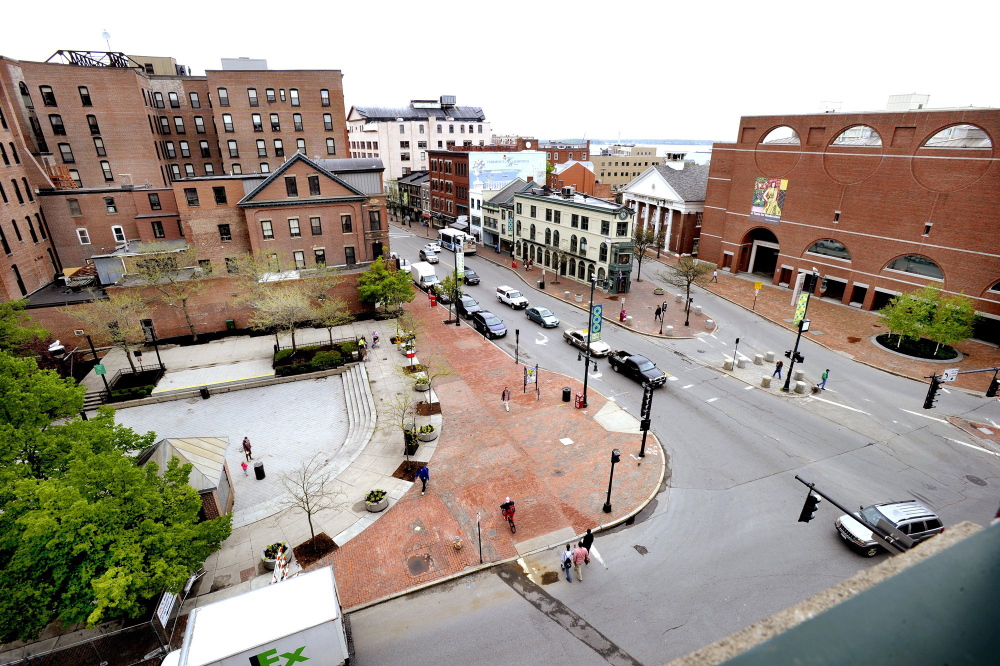Some Portland voters may be confused about the June 10 referendum, and it’s easy to see why.
Protect Our Parks, the group behind Question 1, has said that the city’s most loved public spaces are in danger of being sold for development. The organization makes its point with pictures on its website of the fountain at Deering Oaks and the view from the Western Promenade, suggesting they are among the gems that could be gone if they are not protected by a citizen-initiated ordinance.
But those parks can’t be sold and would not receive a drop more protection than they already have if this ordinance were to pass. A closer look at this issue shows that it’s not Portland’s parks that are under attack – it’s Portland’s representative democracy that is in danger, and voters should not take the threat lightly.
The referendum is broadly worded, but it’s really about only one park, the one in Congress Square.
This ordinance would retroactively undo the City Council’s 6-3 vote last year to sell part of the plaza on the corner of Congress and High streets, to be developed as an event center by the Eastland Hotel, which is next door.
The hotel would buy about two-thirds of the existing park and assist in the redevelopment of the remaining public space to create a unified Congress Square, with improved pedestrian access across Congress Street to connect the plaza with the property in front of the Hay building and the Portland Museum of Art.
HELP WHERE IT’S NEEDED
Supporters of the deal say that it would bring vitality to a blighted but important urban crossroads and add to, rather than subtract from, the city’s inventory of public space.
But you don’t have to agree with them to see that passing this referendum would be bad for Portland.
The referendum is built on the idea that the city’s parks are under attack, but the facts just don’t support that notion.
Over the last 25 years, under a succession of city managers, councils and now an elected mayor, Portland has been adding to its inventory of public space at a historic rate, not selling it off. Trails on the Eastern Prom, through Bayside and along the Fore and Presumpscot rivers show that adding to the inventory of public land has been a priority in this city. There have been other additions, like Post Office Park, the Canco Woods preserve and a playground and public space at the old Marada Adams School site on Munjoy Hill.
Portland’s iconic parks, like the Eastern Prom and Western Prom, are protected by statute. Deering Oaks and many others are protected by deed – requiring the city to give the land back to its former owners if it’s not used as a park. Other public lands have the added protection of a city ordinance passed this year that prevents their sale without a supermajority vote of the council.
What’s not protected is Congress Square park, and that’s what’s behind this referendum, but it does a lot of damage getting the job done.
If successful, the new ordinance would take decisions out of the hands of the city’s duly elected leaders, creating a five-year period where no public property can be sold without a supermajority of the council, approval by the unelected members of the Land Bank Commission and a public referendum. The city should not add layers of complexity to its operations without having a very good reason, and saving Congress Square park in its current configuration is not a good enough reason.
Supporters of the existing park and Question 1 make some good points. It’s true that the property has been neglected by the city over the years and that a one-story building, as proposed by the hotel, is probably not the best use of such prominent real estate.
PLENTY OF PROCESS
But when the supporters say that there hasn’t been enough debate over the Congress Square plan, they are wrong.
The park’s shortcomings were made the subject of a community task force in 2008. Developing part of the plaza has been publicly discussed since 2011. It was the subject of hearings before the City Council’s Community Development Committee before coming to the full council.
In the end, the vote was not unanimous, but that’s how democracies work when issues are complex. In the end, the majority should rule, even when some people are unhappy with the outcome.
Too often in Portland, that’s not how it works, and those on the losing side won’t accept an outcome they don’t like. There is a better way to handle these conflicts.
There will be a City Council election in November and a mayoral election next year. Friends of Congress Square and Protect Our Parks could mobilize in those races and work to elect people who more closely reflect their values. If those candidates win, the next close vote could go their way.
But rewriting the city charter to get a do-over of a single close call does not make sense. Portland voters should recognize what’s really at stake here and vote “no” on June 10.
Send questions/comments to the editors.



Success. Please wait for the page to reload. If the page does not reload within 5 seconds, please refresh the page.
Enter your email and password to access comments.
Hi, to comment on stories you must . This profile is in addition to your subscription and website login.
Already have a commenting profile? .
Invalid username/password.
Please check your email to confirm and complete your registration.
Only subscribers are eligible to post comments. Please subscribe or login first for digital access. Here’s why.
Use the form below to reset your password. When you've submitted your account email, we will send an email with a reset code.